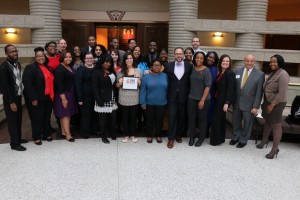

“Public Allies is a signature component of the University of Michigan-Dearborn’s commitment to the Detroit metropolitan region,” said Ismael Ahmed, associate provost for metropolitan impact. “The university continues to partner with communities throughout southeast Michigan to cultivate regional leaders and enhance pathways to post-secondary education.”
The inaugural class of 28 participants—called Allies—will partner with local nonprofit and civic organizations on leadership development opportunities throughout the next ten months. Their work will focus on regional goals including economic development and civic infrastructure.
“Detroit is filled with talented, committed and diverse young people who are the key to its future,” said Paul Schmitz, CEO of Public Allies. “Public Allies is excited to work with these young leaders to contribute to that future.”
Allies will work with 19 partner organizations including: ACCESS, Arab American National Museum, CBM Health Care Inc., Center for Urban Youth and Family Development, Charles H. Wright Museum of African American History, Excellent Schools Detroit, Focus: HOPE, Girl Scouts of Southeastern Michigan, Harriet Tubman Center, Karmanos Cancer Institute, Mosaic Youth Theatre of Detroit, North Rosedale Park Civic Association, REACH Inc., Self Help Addiction Rehab Inc., Southwest Solutions, Teen HYPE, Urban League of Detroit and Southeastern Michigan, Wayne County Health Department and Youth Development Commission.
Ozzie Rivera, director of community engagement at Southwest Solutions, said Allies will work within the community to strengthen the organization’s mission.
“Our Allies will help us elevate our efforts in community engagement in southwest Detroit in a way we couldn’t do on our own,” Rivera said. “They will collaborate together to look at their projects—like using arts as an advocacy tool, economic development and working within the community schools—in a more holistic way.”
Allies—60 percent of whom have not earned a college degree—will receive a $5,500 educational award that can be applied to student loans or future education in addition to a monthly stipend.
Jerrard Wheeler, an Ally at the Wright Museum, applied for the position because of his growing interest in community service.
“It’s a dream come true to be a part of Public Allies,” he said. “I’m excited to work with the Charles H. Wright Museum and to see how I grow from the experiences I gain.”
Public Allies is a federally funded AmeriCorps service program that currently operates in 23 sites nationwide through the Corporation for National and Community Service. UM-Dearborn’s Office of Metropolitan Impact received a $365,000 federal grant to operate Public Allies Metro Detroit in partnership with AmeriCorps.





